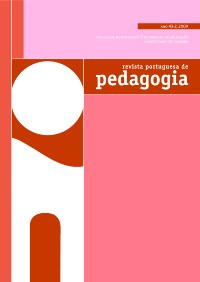Please use this identifier to cite or link to this item:
https://hdl.handle.net/10316.2/5557| DC Field | Value | Language |
|---|---|---|
| dc.contributor.author | Urbano, Maria José | - |
| dc.contributor.author | Branco, Maria Luísa | - |
| dc.contributor.other | Universidade de Coimbra. Faculdade de Psicologia e de Ciências da Educação (ed. lit.) | - |
| dc.date.accessioned | 2012-09-12T13:34:15Z | |
| dc.date.accessioned | 2020-10-06T20:26:50Z | - |
| dc.date.available | 2012-09-12T13:34:15Z | |
| dc.date.available | 2020-10-06T20:26:50Z | - |
| dc.date.issued | 2009 | - |
| dc.identifier.issn | 1647-8614 | - |
| dc.identifier.uri | https://hdl.handle.net/10316.2/5557 | - |
| dc.description.abstract | O programa da disciplina de Educação Visual e Tecnológica (EVT) do 2.º Ciclo do Ensino Básico privilegia uma pedagogia activa, apontando para o método de resolução de problemas. A complexidade do mesmo e as exigências envolvidas na sua aplicação fazem, contudo, que ele não seja seguido por todos os docentes que leccionam a disciplina. Acresce a estes aspectos, o facto da criação desta ser relativamente recente sendo leccionada por professores com formação diversa. Na presente investigação, de natureza qualitativa, estudámos as práticas de dois pares pedagógicos de EVT, procurando compreender qual a importância e as vantagens da aplicação do método de resolução de problemas. As conclusões alcançadas salientam o seu potencial formativo em termos de uma aprendizagem significativa, apesar das resistências iniciais dos alunos, as condições de trabalho e a falta de formação dos docentes. | por |
| dc.description.abstract | Le programme de la discipline d’Éducation Visuelle et Technologique (EVT) du deuxième Cycle de L’Enseignement Basique privilégie une pédagogie active. La méthode préconisée est la méthode de la résolution de problèmes. Sa complexité et l’exigence que requiert son application sont des obstacles à qu’elle soit suivie par tous les professeurs. D’ailleurs la discipline d’EVT est récente et les professeurs habilités ont des formations très hétérogènes. Cette recherche, qui suit une méthodologie qualitative, repose sur l’étude des pratiques de deux pairs pédagogiques d’ EVT, ayant pour but comprendre son importance et avantages. Les conclusions obtenues détachent son potentiel de formation pour l’achèvement d’un apprentissage significative. Les principaux obstacles identifiés sont la résistance initiale des élèves, les conditions de travail et les lacunes de formation des professeurs. | fra |
| dc.description.abstract | The program of the subject Visual and Technology Education (5th and 6th grades of Portuguese elementary education) is geared towards an active pedagogy, recommending the application of the Problem-Based Learning method. However, the complexity and the high level of performance it requires are obstacles to its application by all teachers. Furthermore, the introduction of Visual and Technology Education is relatively recent in the Portuguese system, which encompasses teachers from very diverse educational backgrounds. In the present research study, following a qualitative methodology, we study the practice of two pedagogical pairs, trying to understand the importance and advantages of following this method. The conclusions obtained point to its potential in achieving a significant learning; the main problems identified being the initial resistance of the students, the working conditions and failures in teachers’ training and education. | eng |
| dc.language.iso | por | - |
| dc.publisher | Imprensa da Universidade de Coimbra | - |
| dc.subject | Learning | eng |
| dc.subject | Problem solving | eng |
| dc.subject | Visual and Technology Education | eng |
| dc.subject | Apprentissage | fra |
| dc.subject | Résolution des problèmes | fra |
| dc.subject | Éducation Visuelle et Technologique | fra |
| dc.subject | Aprendizagem | por |
| dc.subject | Resolução de problemas | por |
| dc.subject | Educação Visual e Tecnológica | por |
| dc.title | A importância da aprendizagem baseada na resolução de problemas em EVT | por |
| dc.type | article | - |
| uc.publication.collection | Revista Portuguesa de Pedagogia 43-2 | - |
| uc.publication.firstPage | 261 | - |
| uc.publication.issue | 2 | - |
| uc.publication.lastPage | 273 | - |
| uc.publication.location | Coimbra | - |
| uc.publication.journalTitle | Revista Portuguesa de Pedagogia | - |
| uc.publication.volume | 43 | por |
| dc.identifier.doi | 10.14195/1647-8614_43-2_14 | - |
| uc.publication.orderno | 15 | - |
| uc.publication.area | Ciências Sociais | - |
| uc.publication.manifest | https://dl.uc.pt/json/iiif/10316.2/5557/275564/manifest?manifest=/json/iiif/10316.2/5557/275564/manifest | - |
| uc.publication.thumbnail | https://dl.uc.pt/retrieve/12330822 | - |
| item.grantfulltext | open | - |
| item.fulltext | With Fulltext | - |
| Appears in Collections: | Revista Portuguesa de Pedagogia | |
Files in This Item:
| File | Description | Size | Format | |
|---|---|---|---|---|
| 14_a_import_ncia_da_aprendizagem_bas....pdf | 215.65 kB | Adobe PDF |  |
Items in DSpace are protected by copyright, with all rights reserved, unless otherwise indicated.
